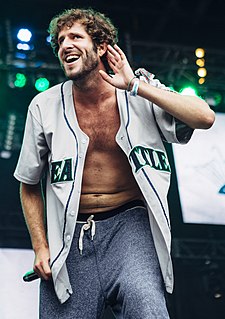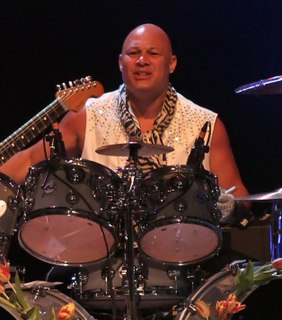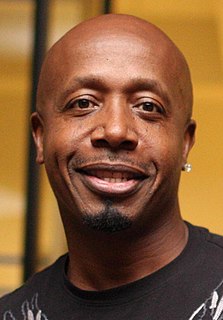A Quote by Lil Dicky
People see a 'South Park' episode, and there's racially insensitive jokes - nobody bats an eye because they're expecting that in that context. In hip-hop, they don't expect that kind of thing because it's a white person in a predominantly black world.
Related Quotes
White people couldn't do black music back in the day because they weren't funky or bad enough. They weren't from the ghettoes, but hip-hop and R&B changed all of that because white kids want to be down with it. They wanted to learn it so they studied the culture. It's kind of a cool thing because we shouldn't be so separate.
Hip-hop ain't died because of the South, that's retarded. When I named the album originally, I thought I bit off more than I could chew but you'd be an idiot to think I'm talking about how the South killed hip-hop or how New York isn't where it should be or where it once was. It was like, "Damn, I need to explain this?" But I thought, "Nah, the proof is right there. We should know what it is." I expect the hip-hop audience to be avant garde. I want them to be where I'm at or beyond where I'm at.
Socially, hip-hop has done more for racial camaraderie in this country than any one thing. 'Cause guys like me, my kids - everyone under 45 either grew up loving hip-hop or hating hip-hop, but everyone under 45 grew up very aware of hip-hop. So when you're a white kid and you're listening to this music and you're being exposed to it every day on MTV, black people become less frightening. This is just a reality. What hip-hop has done bringing people together is enormous.
When I say hip-hoppers, I mean black, white, Asian, Latino, Chicano, everybody. Everybody. Hip-hop has united all races. Hip-hop has formed a platform for all people, religions, and occupations to meet on something. We all have a platform to meet on now, due to hip-hop. That, to me, is beyond music. That is just a brilliant, brilliant thing.
I've been on predominantly 'white' shows before, and I had also been on predominantly 'black' shows. I would complain that when I was on a white show, they would only hire me because there was a black character or they needed a black voice. But then I would be mad if they went and hired a white dude in my position.
Well, we have to realize the truth about the person who is a hip-hop insider. Most of these people are not really insiders. They are people who are chosen to do an interview and they will make a statement and say that they are a part of the hip-hop culture, but from an intellectual standpoint, they are not very sharp, because back in '1990..'91 one would criticize somebody for doing one type of commercial and say that's not real hip-hop and then another rapper turns around and sell them malt liquor and say that's real hip hop.
A friend of mine said that when Barack Obama was running for president, there was a whole generation of white kids who are used to looking up to a black person center stage speaking. And that's because of hip-hop. So there was no adjustment. A person of color in authority at times is very startling to people. But as time goes on, it becomes less startling.
For instance, one big issue in hip hop is the gay thing. It's 2013, and it's a shame that, to this day, that topic still gets people all excited. It's crazy. And it makes me upset that this topic even matters when it comes to hip hop, because it makes it seem like everybody in hip hop is small-minded or stupid - and that's not the case.
I think that hip-hop should be spelled with a capital "H," and as one word. It's the name of our black people culture, and it's the name of our identity and consciousness. I think hip-hop is not a product, but a culture. I think rap is a product, but when hip-hop becomes a product, that's slavery, because you're talking about people's souls. To me, that's the biggest problem.



































